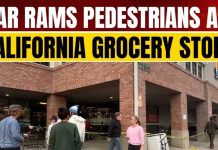
Eight hundred fifty thousand Virginians woke up to discover their next meal could be lost in the crossfire of Congress, as Governor Youngkin declared a state emergency over the federal shutdown threatening SNAP benefits.
Story Snapshot
- Governor Youngkin invoked emergency powers to address a looming halt of SNAP benefits for over 850,000 residents.
- The federal government shutdown, blamed by Youngkin on Congressional Democrats, imperils November food assistance.
- Virginia food banks say they cannot fill the gap left by lost federal funds.
- The crisis spotlights a rare state-level intervention and intensifies partisan tensions.
Governor’s Emergency Action Confronts Federal Inaction
Governor Glenn Youngkin’s declaration of a state of emergency on October 23, 2025, was not just another press release. It was a direct response to a crisis that could leave hundreds of thousands of Virginians without basic food assistance. The issue: the ongoing federal government shutdown has frozen funding for SNAP, the vital Supplemental Nutrition Assistance Program. Youngkin did not mince words, assigning blame to Congressional Democrats for refusing a continuing resolution, and insisting the state would step in if federal dollars failed to arrive.
SNAP, a lifeline for low-income families, was suddenly in jeopardy—not due to local mismanagement, but because of gridlock in Washington. October benefits had been distributed, but November’s future hung by a thread. Youngkin’s announcement sent shockwaves through social services and food banks, which warned that the scale of need could quickly overwhelm their capacity. The state government’s intervention, while unprecedented, was clear: Virginians would not be left hungry for lack of federal action.
Food Banks Sound the Alarm: SNAP Is Irreplaceable
Virginia’s Federation of Food Banks, the front line against hunger, quickly made clear that emergency food relief cannot substitute for the federal SNAP program. For every meal food banks supply, SNAP provides nine more, according to sector experts. Eddie Oliver, executive director, voiced a stark warning: “There is simply no way that we can make up significant gaps or losses to that program.” The math is unyielding. Charitable organizations, stretched thin in normal times, face a tidal wave of need if federal funding disappears. Their message to state officials was urgent and unequivocal: without federal nutrition programs, millions will go hungry.
Local governments echoed these warnings. Fairfax County officials reported a potential loss of $9.9 million in monthly SNAP benefits, with 172,000 residents in Central Virginia alone at risk. Food banks and social services braced for an influx, but acknowledged they could not fill the void left by a lapsed federal program. The state’s emergency response, while necessary, is a stopgap, not a solution. Long-term hunger relief requires the restoration of federal SNAP funding, not just temporary state aid.
Partisan Blame and Political High Stakes
The emergency declaration was as much a political statement as a policy maneuver. Youngkin’s official remarks pointedly accused Congressional Democrats of leveraging vulnerable Virginians for political gain. Senators Mark Warner and Tim Kaine were called out by name, urged to resolve the impasse and restore funding. The governor’s office positioned state intervention as a last resort, forced by federal inaction. Meanwhile, no direct statements from Democratic leaders were cited in official releases, leaving the narrative firmly framed by Youngkin’s perspective.
This episode highlights deepening divisions between state and federal officials, underscoring how national budget battles can have immediate, life-altering consequences for ordinary citizens. The stakes are high: food insecurity, economic hardship, and potential public backlash. For SNAP recipients, the drama unfolding in Washington is not an abstract debate—it is a crisis that determines whether their families eat.
State Resources Mobilized, Uncertainty Remains
As of October 24, state agencies were mobilizing to provide emergency food benefits if federal funds remained stalled. Food banks prepared for surging demand, coordinating with local governments and awaiting further guidance from Richmond. For now, October benefits have been distributed, but November’s fate remains uncertain. State leaders pledged to fill the gap, but acknowledged that even extraordinary measures would not be enough if the shutdown drags on.
The broader implications are sobering. Prolonged loss of SNAP funding could exhaust state emergency budgets and cripple charitable operations. Grocery retailers face declining sales, while communities confront rising poverty and malnutrition. The crisis is a case study in how federal dysfunction can ripple through every level of society, testing the limits of state intervention. As partisan tensions escalate, the ultimate resolution lies not in Richmond, but in Washington—where the power to restore SNAP, and the well-being of millions, hangs in the balance.
Sources:
WTVR: Virginia state of emergency over SNAP benefits
Governor Youngkin’s official statement
Fairfax County: SNAP benefits update









